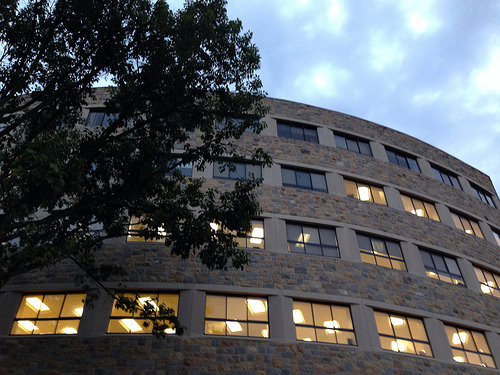

Last fall, I defended my Ph.D. dissertation, and in May I attended my graduation at Virginia Tech’s Blacksburg campus. My studies were challenging, especially since I was changing my discipline, from engineering to Science and Technology Studies (STS), which is built around a core of history, sociology, and philosophy. Fortunately, I had some advantages as a “non-traditional” student. First, I was accustomed to research and writing after a long, successful career as an engineer. Second, my STS interests ran deep. And finally, I had strong support from my wife and family. With God’s grace, I did not find the work to be impossible. The greatest stress resulted from my own decision—against the advice of my adviser—to take a job in 2014 teaching and helping to start a new engineering program (whew!) before I finished my dissertation. I am glad that my Ph.D. quest is over, and I look to God for how to best use my expanded education for His glory.
Friends have noted that Christian theology is at the heart of my dissertation, and they wonder how my work was received at a secular university. They seem interested in how I “got away” with proclaiming the Christian gospel in the course of my studies. How can I explain my success in what is assumed to be a hostile environment?
With few exceptions, my engineering experiences were free of conflicts of faith. Still, I grew interested in the place of technology in God’s plan. I remain concerned that endless debates over human origins distract us from considering what Christ would have us do in the present as we help shape the future. With this interest, I began taking STS classes part time during my last two years of engineering work.
Early on in my studies, I was surprised and pleased to learn that Christianity is broadly recognized as an important factor in the scientific revolution. This begged the question of why some segments of the Church are so distrustful of science, while accepting its fruits in medicine and technology without question. I looked for a dissertation topic that would highlight such concerns, and my adviser suggested I study transhumanism. Its focus on technological enhancements to human beings is essentially religious, with its goal of immortality and the creation of a godlike artificial superintelligence.
So here lies the answer to my friends’ questions: my desire was to study relationships between Christianity and technology, and God brought me to a subject I had never heard of, yet one that cried out for a theological examination. Yes, I ran into some opposition, but 1 John 3:13 says we should not be surprised “that the world hates you.” I was not surprised by skeptics, but I did not assume that I would be hated. My interest in STS scholarship was genuine, and with few exceptions, the Virginia Tech faculty, fellow students, and my advisory committee supported me in pursuing my interests.
No doubt, Christian students in secular universities experience a wide variety of responses. My success may not be typical. Still, I find in it confirmation of Psalm 37:4: “Delight yourself in the LORD, and he will give you the desires of your heart.” May God lift you up in your studies!
David Winyard Sr., PhD, is a retired engineer, professor, and STS scholar. He lives in Mount Vernon, OH.

A blessing indeed. I just Googled: God help me finish my dissertation and this article came up. Thank you. To God be the glory. Signing off to get these final corrections done.
Glad you found it helpful. How’s your dissertation coming along?
I successfully Defended on November 17, 2020! Very helpful. God keep blessing you!
Excellent Gwendolyn!
Praise report. Two weeks before my defense I had my first sinus migraine. Horrible head pain and not able to look at the pc screen for a week for no more than a minute. But God.
Ugh. I’m reminded of my once-a-month migraines. 🙁
Gwendolyn, glad to hear this was an encouragement to you. I said a prayer for your dissertation process today–best wishes on final corrections! David, thanks so much for sharing these encouraging thoughts. -Hannah (ESN Assistant Director & Blog Editor)
Thank you much for the prayer. Gwendolyn Hayes, Ed.D, Ed.S
To God be ALL the Glory
Thanks for sharing! This gave me lots of encouragement. I am in the final weeks of my program. The last chapter is being reviewed by my dissertation chair. It is my hope to defend in early April if I can clean up the chapter to my chair’s liking. The pandemic compounded with work, marriage and a newborn (born Sept 2020) has brought lots of challenges. But God…. I am trying to keep trucking along with the Peace of God at heart.
Great! It’s nice to get to the finishing line! Defended yet?